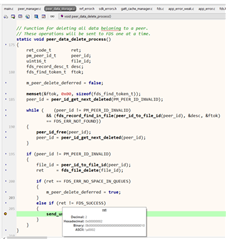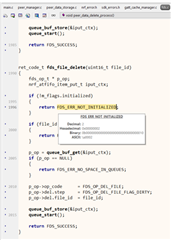Hi
I am using nRF52DK, SDK 15.0, SD 6.0.0, multiperipheral based example with secure bootloader, FDS (7 FDS_VIRTUAL_PAGES). Uploading new software works (not tested thorougly).
Project building with SES, then flashing with a script:
SET family= NRF52 SET application= C:\repo\pikflometr\multiperipheral\pca10040\s132\ses\Output\Release\Exe\ble_app_multiperipheral_pca10040_s132.hex SET application-version= 1 SET soft_device= C:\repo\pikflometr\lib\wszystkoCzegoPotrzebujesz\s132_nrf52_6.0.0_softdevice.hex SET bootloader= C:\repo\pikflometr\secure_bootloader\pca10040_ble\ses\Output\Release\Exe\secure_bootloader_ble_s132_pca10040.hex SET bootloader-version= 1 SET bl-settings-version= 1 SET settings= settings_1.hex SET dfu_client= dfu_client_1.hex SET nrfutil_location= C:\repo\pikflometr\lib cd %nrfutil_location% nrfjprog.exe --family %family% --program %soft_device% --chiperase --verify nrfutil settings generate --family %family% --application %application% --application-version %application-version% --bootloader-version %bootloader-version% --bl-settings-version %bl-settings-version% %settings% mergehex -m %application% %settings% -o %dfu_client% nrfjprog.exe --family %family% --program %dfu_client% --verify nrfjprog.exe --reset --family %family% --program %bootloader% --verify
then F5 to begin debugging with SES.
Sometimes (maybe 15% of times) when I try to pair (using master Androd device) I get:
<error> app: ERROR 2 [NRF_ERROR_SOFTDEVICE_NOT_ENABLED] at C:\repo\pikflometr\multiperipheral\main.c:1808 PC at: 0x00033AA7
which is from PM_EVT_ERROR_UNEXPECTED case
static void pm_evt_handler(pm_evt_t const * p_evt)
{
ret_code_t err_code;
switch(p_evt->evt_id)
{
case PM_EVT_ERROR_UNEXPECTED:
NRF_LOG_RAW_INFO("PM_EVT_ERROR_UNEXPECTED \n");
// Assert.
APP_ERROR_CHECK(p_evt->params.error_unexpected.error);
...}
It tells me that NRF_ERROR_SOFTDEVICE_NOT_ENABLED which is silly because I have already connected with an advertising device, so BLE stack is up and running.
After some digging I have found out that peer_data_delete_process() calls send_unexpected_error()



So it looks like sometimes the FDS module does not initialize.
I added some logs and here is what I got after booting:
FAILING CASE:
<info> app: __________________start <info> app: ~~ ZMIANA NAZWY (na v1) W: gap_params_init <info> app: Setting vector table to bootloader: 0x00078000 <info> app: Setting vector table to main app: 0x00026000 <info> app: zostaje domyslny adv_name <error> app: bzdurne wartosci ts:0, cnt:0 <info> app: nie ma w ogole pomiarow offline, bo secret_word to: 26DB1 wobec 0xAAAAAAAA <info> app: epoch 0 <info> app: battery_meas handler rusza <info> app: reset_reason: 0x00000004.
WORKING CASE:
<info> app: __________________start <info> app: ~~ ZMIANA NAZWY (na v1) W: gap_params_init <info> app: Setting vector table to bootloader: 0x00078000 <info> app: Setting vector table to main app: 0x00026000 .......fds..FDS_EVT_INIT .......fds..FDS_EVT_WRITE .......fds..FDS_EVT_UPDATE .......fds..FDS_EVT_DEL_RECORD <info> app: zostaje domyslny adv_name <error> app: bzdurne wartosci ts:0, cnt:0 <info> app: nie ma w ogole pomiarow offline, bo secret_word to: 26DB1 wobec 0xAAAAAAAA <info> app: epoch 0 <info> app: battery_meas handler rusza <info> app: reset_reason: 0x00000001.
So all the difference is the FDS event logs don't appear occassionaly.
The logs that makes difference between failing and working case are in peer_data_storage.c:
static void fds_evt_handler(fds_evt_t const * const p_fds_evt)
{
pm_evt_t pds_evt =
{
.peer_id = file_id_to_peer_id(p_fds_evt->write.file_id)
};
switch (p_fds_evt->id)
{
case FDS_EVT_INIT:
NRF_LOG_RAW_INFO(".......fds..FDS_EVT_INIT\n");
case FDS_EVT_WRITE:
NRF_LOG_RAW_INFO(".......fds..FDS_EVT_WRITE\n");
case FDS_EVT_UPDATE:
NRF_LOG_RAW_INFO(".......fds..FDS_EVT_UPDATE\n");
case FDS_EVT_DEL_RECORD:
NRF_LOG_RAW_INFO(".......fds..FDS_EVT_DEL_RECORD\n");
.....}
---
Furthermore I have added those logs to observe the state of flash memory:
NRF_LOG_INFO("pages_available %d open_records %d valid_records %d",
stat.pages_available,stat.open_records,stat.valid_records);
NRF_LOG_INFO("dirty_records %d words_reserved %d words_used %d",
stat.dirty_records,stat.words_reserved,stat.words_used);
NRF_LOG_INFO("largest_contig %d freeable_words %d corruption %d",
stat.largest_contig,stat.freeable_words,stat.corruption);
And here is the output (called after booting before trying to pair):
FAILING CASE:
<info> app: pages_available 0 open_records 0 valid_records 0 <info> app: dirty_records 0 words_reserved 0 words_used 0 <info> app: largest_contig 0 freeable_words 0 corruption 0
WORKING CASE:
<info> app: pages_available 7 open_records 0 valid_records 0 <info> app: dirty_records 0 words_reserved 0 words_used 12 <info> app: largest_contig 1022 freeable_words 0 corruption 0
What more info do you need to guide me to solve this?
Thanks





